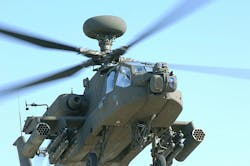Army looks to Lockheed Martin to upgrade laser targeting for AH-64E Apache attack helicopter
ORLANDO, Fla., 18 Aug. 2015.Electro-optics experts at Lockheed Martin Corp. are upgrading the laser targeting system of the U.S. Army AH-64E Apache attack helicopter under terms of a $21.7 million contract.
Officials of the Lockheed Martin Missiles and Fire Control segment in Orlando, Fla., announced the $21.7 million U.S. Army Lot 4 follow-on contract last week.
The contract calls for Lockheed Martin to build Modernized Laser Rangefinder Designator (M-LRFD) kits, which will improve the principal targeting aid for the Apache that enables pilots to designate targets and establish target range for accurate weapon engagement, company officials say.
The contract is part of a project to upgrade the Modernized Day Sensor Assembly (M-DSA) for the Apache helicopter. M-DSA is an upgrade to the helicopter's targeting and pilotage system, or Modernized Target Acquisition Designation Sight/Pilot Night Vision Sensor (M-TADS/PNVS), Lockheed Martin officials say.
Lockheed Martin is on contract to produce and deliver 786 M-LRFD kits for the Army and international customers. "We are on track to equip approximately seven Apache battalions a year,” says Matt Hoffman, the M-TADS/PNVS director at Lockheed Martin Missiles and Fire Control.
Lockheed Martin also is ready to take the next step in the Apache's M-DSA upgrades. The company has M-DSA Phase 2 upgrades and is ready start production. These upgrades will enable Apache pilots to see high-resolution, near infrared, and color imagery on cockpit displays.
Phase 2 upgrades also include a new laser pointer marker and a multi-mode laser with eye-safe lasing capability to help Apache pilots coordinate with ground troops and fly safely in urban environments and during training exercises.
For more information contact Lockheed Martin Missiles and Fire Control online at www.lockheedmartin.com.

John Keller | Editor
John Keller is editor-in-chief of Military & Aerospace Electronics magazine, which provides extensive coverage and analysis of enabling electronic and optoelectronic technologies in military, space, and commercial aviation applications. A member of the Military & Aerospace Electronics staff since the magazine's founding in 1989, Mr. Keller took over as chief editor in 1995.

